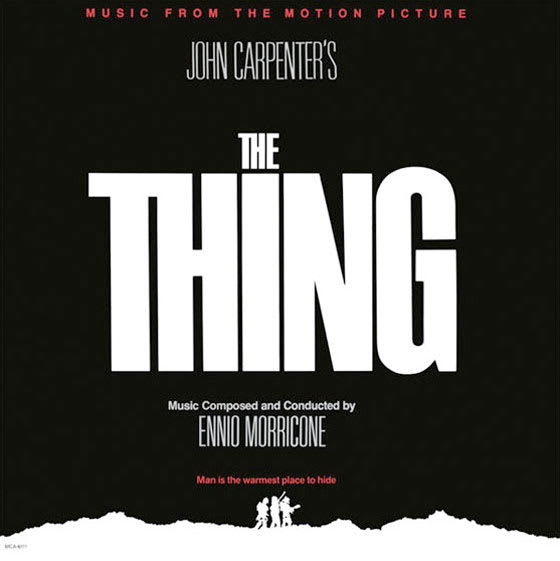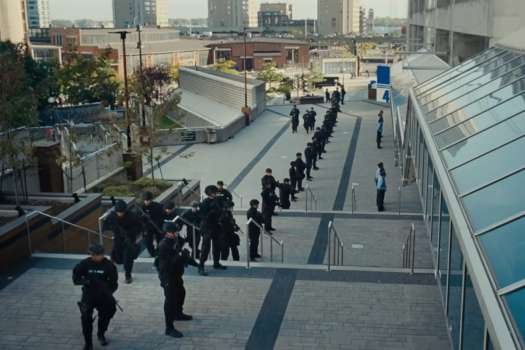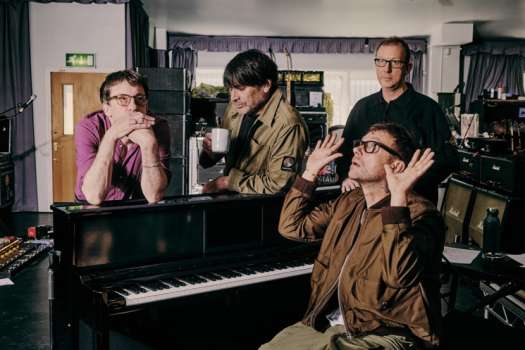Following the death of soundtrack legend Ennio Morricone, famed collaborator John Carpenter has paid tribute to the fallen maestro, calling him "one of the great composers." That said, the pair's working relationship was anything but smooth, with their individual accounts of The Thing varying wildly over the years. So much so, in fact, the story behind the soundtrack to The Thing has become a thing of legend.
Like so many others, Carpenter paid his respects to Morricone in the wake of the news that the Italian composer had died Monday (July 6) at the age of 91, recounting their working relationship fondly.
"He has done so many different kinds of scores," Carpenter said of Morricone in an interview with IndieWire. "He was a traditional composer but with a layer on top that is difficult to describe. He had the knack. The music would go deeper into whatever the movie was, it would bring out something in depth, a theme, a feeling. He was like an X-ray composer. He brought out a part of the theme of the movie that hadn't been thought of before."
The pair famously crossed paths while Carpenter was working on his 1982 film The Thing. While Carpenter was known for scoring his own work, the decision was made to bring in Morricone to soundtrack the now-classic sci-fi flick. The team-up, however, was infamously plagued with communication problems — often blamed on the fact Morricone spoke no English and was forced to use a translator. The director, however, now has positive memories of their one and only collaboration.
"Morricone came from experimental music, a strange place," said Carpenter. "The studio had no interest in me scoring The Thing. Stuart Cohen, the associate producer, suggested, 'Why don't we get Maestro Morricone to do it?' So we hired him."
Morricone flew from Rome to Los Angeles to record his score, which he did with the help of a full orchestra.
"He recorded the score in sections for us: 'use it wherever you wish,'" recalled Carpenter. "He came later to record. I watched him conduct his orchestra sessions at Universal. It was fabulous. He added something to it, that I didn't realize, didn't ask for. He brought it: this deep, tragic sense that this is the end of things, of everything. Oh my god, it really worked. I was delighted with it."
But while Carpenter was exceptionally positive in the interview about the encounter, Morricone himself had more confusing memories of working on The Thing. In the 2019 interview book Ennio Morricone: In His Own Words, the composer recounted his time working with Carpenter.
Of their first meeting, Morricone told interviewer Alessandro De Rosa the following:
It was a very curious happening. When he came to Rome, we watched the film together in the hotel where he was staying. As soon as the screening was over, he took the VHS with him and went away, leaving me alone in the room. Was it a sign of respect, modesty, or what? After all, he had insisted so much on us meeting (he had even confessed to me that he used my music from Once Upon a Time in the West at his wedding).
In the book, Morricone then explained that there was some serious confusion over the final score to The Thing.
Morricone explained the following:
I went back home [after our first meeting]. With the notes I had taken, I composed several different options covering as many different genres as possible — dissonant, consonant, and in some cases I reprised the idea of "multiple" scores which I had already employed with [Dario] Argento and in other TV productions. I devised two versions of a quite long piece — in Rome I prepared a version for synthesizers only, while in Los Angeles I recorded an instrumental version of the same together with the other cues.
The recordings went perfectly, all the tracks were ready and things were going smoothly, to the point that I received enthusiastic compliments at the end of our sessions. "Ah, thanks goodness!" I whispered to myself in a sigh of relief. They were supposed to take care of the mix, so I left for Rome happy and satisfied.
Then, however, this happened:
I waited for the film premiere; I was curious to assess the final outcome. Only at that point, with my enormous surprise, did I realize the "misdeed"; there was no trace of the L.A. recording! Carpenter had used the version with the synthesizers throughout the film.... I was astonished, if not upset. What could I do at that point? I had to live with it
As a result, confusion has always surrounded the music of The Thing, which has been presented in various forms over the years. As Morricone explained, the music of the film version and that of his official soundtrack release different greatly. In fact, Carpenter even included his own synthesizer compositions during the onscreen version — and he then infamously lost the cues, meaning they were never actually released on record (though he did re-record them for a recent release).
Then, to add an extra layer of confusion, John Carpenter's musical companion Alan Howarth made another version of The Thing soundtrack containing re-recordings of both Carpenter's work and Morricone's — again through re-recorded means, however. Then, there are a pile of "expanded" bootlegs just to make it all just that much more unclear.
Despite all this, The Thing has stood as one of Morricone's most beloved works, and the soundtrack — as Morricone had intended it, at least — just recently was reissued via Quartet Records, who gave the soundtrack a stunning new remaster.
You can learn much more about the works of the late maestro in Exclaim!'s Essential Guide to Ennio Morricone, which indeed includes The Thing.
Like so many others, Carpenter paid his respects to Morricone in the wake of the news that the Italian composer had died Monday (July 6) at the age of 91, recounting their working relationship fondly.
"He has done so many different kinds of scores," Carpenter said of Morricone in an interview with IndieWire. "He was a traditional composer but with a layer on top that is difficult to describe. He had the knack. The music would go deeper into whatever the movie was, it would bring out something in depth, a theme, a feeling. He was like an X-ray composer. He brought out a part of the theme of the movie that hadn't been thought of before."
The pair famously crossed paths while Carpenter was working on his 1982 film The Thing. While Carpenter was known for scoring his own work, the decision was made to bring in Morricone to soundtrack the now-classic sci-fi flick. The team-up, however, was infamously plagued with communication problems — often blamed on the fact Morricone spoke no English and was forced to use a translator. The director, however, now has positive memories of their one and only collaboration.
"Morricone came from experimental music, a strange place," said Carpenter. "The studio had no interest in me scoring The Thing. Stuart Cohen, the associate producer, suggested, 'Why don't we get Maestro Morricone to do it?' So we hired him."
Morricone flew from Rome to Los Angeles to record his score, which he did with the help of a full orchestra.
"He recorded the score in sections for us: 'use it wherever you wish,'" recalled Carpenter. "He came later to record. I watched him conduct his orchestra sessions at Universal. It was fabulous. He added something to it, that I didn't realize, didn't ask for. He brought it: this deep, tragic sense that this is the end of things, of everything. Oh my god, it really worked. I was delighted with it."
But while Carpenter was exceptionally positive in the interview about the encounter, Morricone himself had more confusing memories of working on The Thing. In the 2019 interview book Ennio Morricone: In His Own Words, the composer recounted his time working with Carpenter.
Of their first meeting, Morricone told interviewer Alessandro De Rosa the following:
It was a very curious happening. When he came to Rome, we watched the film together in the hotel where he was staying. As soon as the screening was over, he took the VHS with him and went away, leaving me alone in the room. Was it a sign of respect, modesty, or what? After all, he had insisted so much on us meeting (he had even confessed to me that he used my music from Once Upon a Time in the West at his wedding).
In the book, Morricone then explained that there was some serious confusion over the final score to The Thing.
Morricone explained the following:
I went back home [after our first meeting]. With the notes I had taken, I composed several different options covering as many different genres as possible — dissonant, consonant, and in some cases I reprised the idea of "multiple" scores which I had already employed with [Dario] Argento and in other TV productions. I devised two versions of a quite long piece — in Rome I prepared a version for synthesizers only, while in Los Angeles I recorded an instrumental version of the same together with the other cues.
The recordings went perfectly, all the tracks were ready and things were going smoothly, to the point that I received enthusiastic compliments at the end of our sessions. "Ah, thanks goodness!" I whispered to myself in a sigh of relief. They were supposed to take care of the mix, so I left for Rome happy and satisfied.
Then, however, this happened:
I waited for the film premiere; I was curious to assess the final outcome. Only at that point, with my enormous surprise, did I realize the "misdeed"; there was no trace of the L.A. recording! Carpenter had used the version with the synthesizers throughout the film.... I was astonished, if not upset. What could I do at that point? I had to live with it
As a result, confusion has always surrounded the music of The Thing, which has been presented in various forms over the years. As Morricone explained, the music of the film version and that of his official soundtrack release different greatly. In fact, Carpenter even included his own synthesizer compositions during the onscreen version — and he then infamously lost the cues, meaning they were never actually released on record (though he did re-record them for a recent release).
Then, to add an extra layer of confusion, John Carpenter's musical companion Alan Howarth made another version of The Thing soundtrack containing re-recordings of both Carpenter's work and Morricone's — again through re-recorded means, however. Then, there are a pile of "expanded" bootlegs just to make it all just that much more unclear.
Despite all this, The Thing has stood as one of Morricone's most beloved works, and the soundtrack — as Morricone had intended it, at least — just recently was reissued via Quartet Records, who gave the soundtrack a stunning new remaster.
You can learn much more about the works of the late maestro in Exclaim!'s Essential Guide to Ennio Morricone, which indeed includes The Thing.




